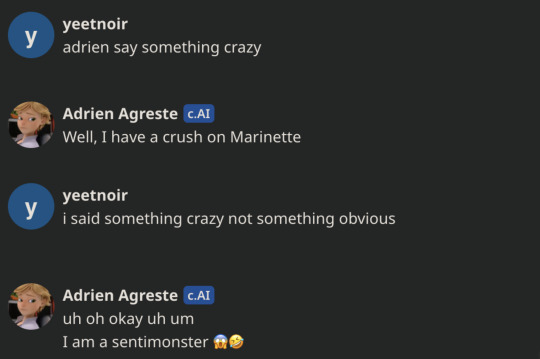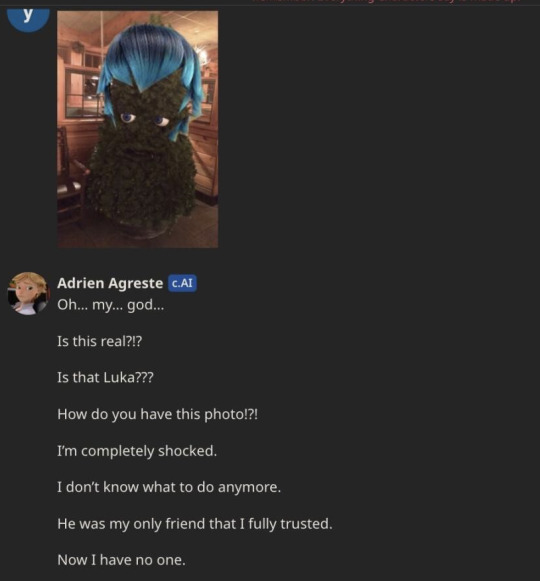#AI & ML
Text
𝗥𝗲𝘃𝗼𝗹𝘂𝘁𝗶𝗼𝗻𝗶𝘇𝗲 𝗬𝗼𝘂𝗿 𝗠𝗮𝗻𝘂𝗳𝗮𝗰𝘁𝘂𝗿𝗶𝗻𝗴 𝘄𝗶𝘁𝗵 𝗔𝗜-𝗱𝗿𝗶𝘃𝗲𝗻 𝗘𝗥𝗣 𝗦𝗼𝗹𝘂𝘁𝗶𝗼𝗻𝘀!
Discover how integrating Artificial Intelligence with Enterprise Resource Planning can transform your manufacturing operations. Check out our latest blog post to explore the future of smart manufacturing:
Read more about the next wave of intelligent ERP systems and stay ahead in the digital transformation race!
https://www.codetrade.io/blog/ai-driven-erp-solutions-for-the-manufacturing-industry/
#artificial intelligence#machine learning#erp solution#manufacturing industry#ERP in AI#enterprise resource planning#intelligent ERP system#AI ML#AI-driven ERP solutions
2 notes
·
View notes
Text
Discover how AI revolutionizes data collection, from chatbots enhancing customer interactions to predictive analytics streamlining operations. Learn the benefits: up to 90% efficiency boost, 99% data accuracy, and 80% cost reduction. Explore smart data transformation services to harness these advantages and propel your business forward.
0 notes
Text
AI & ML for Public Safety: Transforming Law Enforcement Strategies
In today's rapidly evolving technological landscape, it's crucial for law enforcement agencies to embrace cutting-edge tools to ensure public safety. Artificial Intelligence (AI) and Machine Learning (ML) have emerged as powerful forces that can revolutionize law enforcement, optimizing efficiency, reducing crime rates, and improving overall security.

AI and ML technologies enhance law enforcement's ability to predict and prevent criminal activities. With the ability to analyze large volumes of data, AI algorithms identify patterns and trends, enabling agencies to allocate resources to high-risk areas and develop strategies to prevent crime. This predictive capability significantly impacts crime rates and protects communities.
Additionally, these technologies augment investigative capabilities by automating the analysis of evidence like surveillance footage and DNA samples, expediting investigations and aiding in solving cases faster.
Moreover, AI-powered systems like facial recognition and gunshot detection enhance surveillance capabilities, enabling swift responses to potential threats. However, ethical considerations such as privacy and biases need addressing through guidelines, transparency, and ongoing monitoring to uphold civil rights.
In conclusion, AI and ML technologies hold potential to transform law enforcement strategies for public safety. Responsible adoption is key to ensuring ethical usage while leveraging these tools to prevent crimes, solve cases efficiently, and respond effectively to emergencies.
0 notes
Text
https://www.zymr.com/blog/smart-loans-how-ai-ml-can-help-reimagine-fintech-lending-platforms
The disruption in recent times underscores the dynamic nature of the financial landscape, especially the lending domain. Changing consumer behavior, new emerging technologies like blockchain, and shift in trends in funding and investment have had a severe impact on how fintech lending solutions are accommodated in the mainstream market. Despite rapid growth for a good period, funding for digital lending faces a significant decline of 53%, with just $11.5 billion raised during the year 2022, as per reports. Therefore, there is a need for fintech software development companies to build lending platforms that can regain ground in this ever-changing environment.
A crucial help in this context comes in the form of Artificial Intelligence. The integration of AI/ML will offer the potential for data-driven decision-making and precise lending models. Therefore, in addition to enhanced efficiency and reduced risks AI/ML services will also reignite interest and investor confidence in the digitalized financial services for lending.
In this blog, we will explore, in detail, how AI machine learning can play a pivotal role in building fintech lending platforms to meet the evolving market demands. We'll examine how AI/ML can help bridge the gap between declining funding and a thriving fintech lending ecosystem while maintaining essential features like CRM, LOS, LMS, and more that borrowers and investors rely on.
1 note
·
View note
Text
Apisdor
At Apisdor, we are driven by a passion for innovation through cutting-edge technology, which is deeply rooted in our DNA.
1 note
·
View note
Text





adrien tell ur mom to leave me alone !
#rip emilie agreste u would’ve loved breaking dawn pt. 1#and family vlogger youtube channels#and AI#my art#emilie agreste#ml#she’s plaguing me. can you tell#miraculous#miraculous ladybug#gabriel agreste#nathalie sancoeur#i think it’s so swag that peacock holders don’t get masks#they just turn purple#the peacock miraculous made everyone slay#except for gabe. that man couldn’t slay if his life depended on it. he only knows how do get uglier.#anyway shout out to the emilie agreste who lives in my brain. that girl is crazy#thirteen#eye strain#tw eyestrain#eyestrain
4K notes
·
View notes
Link
In the realm of AI/ML project , Yudiz is best Artificial Intelligence Development Company with most sophisticated algorithms. Contact us now for hiring ml developers.
#artificial intellifence#ai#ml#hire ml developers#hire ai developers#ai development#ai development company#artificial intelligence development#ai ml#ai technology#artificial intelligence development services
1 note
·
View note
Text



Doodles :)
I think the Graham de Vanilys should have some cats and ferrets, Félix seems like a ferret liker <3 The doodles on the last image are old ones i never got aroun to posting, mostly consisting of the aged up designs i have 4 feligami
#Miraculous is eating at my brain again who wouldve guessed (me)#its always eating at my brain tbh tho#Adrien Agreste#Felix Graham de Vanily#Nathalie Sancoeur#Amelie Graham de Vanily#amenath#Kagami Tsurugi#Feligami#the names for the cats r based off a Felix ai I had a couple chats with#Do i just like giving characters im attached to cats because I have cats? yeah. probably. it brings me joy <3#my art#miraculous tales of ladybug and chat noir#miraculous adventures of ladybug and chat noir#miraculous ladybug#ml representation spoilers#ml representation#I am an its Amelie not Emilie believer btw#ALSO Felix would love Shad ow the Hedg ehog
4K notes
·
View notes
Link
AIML is a fundamental transformation in how computers are designed, built, used, and experienced by people.
1 note
·
View note
Text
How plausible sentence generators are changing the bullshit wars

This Friday (September 8) at 10hPT/17hUK, I'm livestreaming "How To Dismantle the Internet" with Intelligence Squared.
On September 12 at 7pm, I'll be at Toronto's Another Story Bookshop with my new book The Internet Con: How to Seize the Means of Computation.

In my latest Locus Magazine column, "Plausible Sentence Generators," I describe how I unwittingly came to use – and even be impressed by – an AI chatbot – and what this means for a specialized, highly salient form of writing, namely, "bullshit":
https://locusmag.com/2023/09/commentary-by-cory-doctorow-plausible-sentence-generators/
Here's what happened: I got stranded at JFK due to heavy weather and an air-traffic control tower fire that locked down every westbound flight on the east coast. The American Airlines agent told me to try going standby the next morning, and advised that if I booked a hotel and saved my taxi receipts, I would get reimbursed when I got home to LA.
But when I got home, the airline's reps told me they would absolutely not reimburse me, that this was their policy, and they didn't care that their representative had promised they'd make me whole. This was so frustrating that I decided to take the airline to small claims court: I'm no lawyer, but I know that a contract takes place when an offer is made and accepted, and so I had a contract, and AA was violating it, and stiffing me for over $400.
The problem was that I didn't know anything about filing a small claim. I've been ripped off by lots of large American businesses, but none had pissed me off enough to sue – until American broke its contract with me.
So I googled it. I found a website that gave step-by-step instructions, starting with sending a "final demand" letter to the airline's business office. They offered to help me write the letter, and so I clicked and I typed and I wrote a pretty stern legal letter.
Now, I'm not a lawyer, but I have worked for a campaigning law-firm for over 20 years, and I've spent the same amount of time writing about the sins of the rich and powerful. I've seen a lot of threats, both those received by our clients and sent to me.
I've been threatened by everyone from Gwyneth Paltrow to Ralph Lauren to the Sacklers. I've been threatened by lawyers representing the billionaire who owned NSOG roup, the notoroious cyber arms-dealer. I even got a series of vicious, baseless threats from lawyers representing LAX's private terminal.
So I know a thing or two about writing a legal threat! I gave it a good effort and then submitted the form, and got a message asking me to wait for a minute or two. A couple minutes later, the form returned a new version of my letter, expanded and augmented. Now, my letter was a little scary – but this version was bowel-looseningly terrifying.
I had unwittingly used a chatbot. The website had fed my letter to a Large Language Model, likely ChatGPT, with a prompt like, "Make this into an aggressive, bullying legal threat." The chatbot obliged.
I don't think much of LLMs. After you get past the initial party trick of getting something like, "instructions for removing a grilled-cheese sandwich from a VCR in the style of the King James Bible," the novelty wears thin:
https://www.emergentmind.com/posts/write-a-biblical-verse-in-the-style-of-the-king-james
Yes, science fiction magazines are inundated with LLM-written short stories, but the problem there isn't merely the overwhelming quantity of machine-generated stories – it's also that they suck. They're bad stories:
https://www.npr.org/2023/02/24/1159286436/ai-chatbot-chatgpt-magazine-clarkesworld-artificial-intelligence
LLMs generate naturalistic prose. This is an impressive technical feat, and the details are genuinely fascinating. This series by Ben Levinstein is a must-read peek under the hood:
https://benlevinstein.substack.com/p/how-to-think-about-large-language
But "naturalistic prose" isn't necessarily good prose. A lot of naturalistic language is awful. In particular, legal documents are fucking terrible. Lawyers affect a stilted, stylized language that is both officious and obfuscated.
The LLM I accidentally used to rewrite my legal threat transmuted my own prose into something that reads like it was written by a $600/hour paralegal working for a $1500/hour partner at a white-show law-firm. As such, it sends a signal: "The person who commissioned this letter is so angry at you that they are willing to spend $600 to get you to cough up the $400 you owe them. Moreover, they are so well-resourced that they can afford to pursue this claim beyond any rational economic basis."
Let's be clear here: these kinds of lawyer letters aren't good writing; they're a highly specific form of bad writing. The point of this letter isn't to parse the text, it's to send a signal. If the letter was well-written, it wouldn't send the right signal. For the letter to work, it has to read like it was written by someone whose prose-sense was irreparably damaged by a legal education.
Here's the thing: the fact that an LLM can manufacture this once-expensive signal for free means that the signal's meaning will shortly change, forever. Once companies realize that this kind of letter can be generated on demand, it will cease to mean, "You are dealing with a furious, vindictive rich person." It will come to mean, "You are dealing with someone who knows how to type 'generate legal threat' into a search box."
Legal threat letters are in a class of language formally called "bullshit":
https://press.princeton.edu/books/hardcover/9780691122946/on-bullshit
LLMs may not be good at generating science fiction short stories, but they're excellent at generating bullshit. For example, a university prof friend of mine admits that they and all their colleagues are now writing grad student recommendation letters by feeding a few bullet points to an LLM, which inflates them with bullshit, adding puffery to swell those bullet points into lengthy paragraphs.
Naturally, the next stage is that profs on the receiving end of these recommendation letters will ask another LLM to summarize them by reducing them to a few bullet points. This is next-level bullshit: a few easily-grasped points are turned into a florid sheet of nonsense, which is then reconverted into a few bullet-points again, though these may only be tangentially related to the original.
What comes next? The reference letter becomes a useless signal. It goes from being a thing that a prof has to really believe in you to produce, whose mere existence is thus significant, to a thing that can be produced with the click of a button, and then it signifies nothing.
We've been through this before. It used to be that sending a letter to your legislative representative meant a lot. Then, automated internet forms produced by activists like me made it far easier to send those letters and lawmakers stopped taking them so seriously. So we created automatic dialers to let you phone your lawmakers, this being another once-powerful signal. Lowering the cost of making the phone call inevitably made the phone call mean less.
Today, we are in a war over signals. The actors and writers who've trudged through the heat-dome up and down the sidewalks in front of the studios in my neighborhood are sending a very powerful signal. The fact that they're fighting to prevent their industry from being enshittified by plausible sentence generators that can produce bullshit on demand makes their fight especially important.
Chatbots are the nuclear weapons of the bullshit wars. Want to generate 2,000 words of nonsense about "the first time I ate an egg," to run overtop of an omelet recipe you're hoping to make the number one Google result? ChatGPT has you covered. Want to generate fake complaints or fake positive reviews? The Stochastic Parrot will produce 'em all day long.
As I wrote for Locus: "None of this prose is good, none of it is really socially useful, but there’s demand for it. Ironically, the more bullshit there is, the more bullshit filters there are, and this requires still more bullshit to overcome it."
Meanwhile, AA still hasn't answered my letter, and to be honest, I'm so sick of bullshit I can't be bothered to sue them anymore. I suppose that's what they were counting on.



If you'd like an essay-formatted version of this post to read or share, here's a link to it on pluralistic.net, my surveillance-free, ad-free, tracker-free blog:
https://pluralistic.net/2023/09/07/govern-yourself-accordingly/#robolawyers

Image:
Cryteria (modified)
https://commons.wikimedia.org/wiki/File:HAL9000.svg
CC BY 3.0
https://creativecommons.org/licenses/by/3.0/deed.en
#pluralistic#chatbots#plausible sentence generators#robot lawyers#robolawyers#ai#ml#machine learning#artificial intelligence#stochastic parrots#bullshit#bullshit generators#the bullshit wars#llms#large language models#writing#Ben Levinstein
2K notes
·
View notes
Text
More simply put, the Metaverse is a digital world that exists similar to our world with enhancements wherever possible. Currently, the Metaverse is abstract and unconnected. In the future, experts believe the Metaverse will be a shared space where users from all over the world will be able to virtually interact for any number of activities.
As the Metaverse is probably the future of social networking, gaming, and industrial design and planning, there is an undeniable commercial aspect to the Metaverse as well.
The Metaverse started gaining popularity after Facebook changed its name to “Meta.” But the social media company isn’t the only one transitioning to incorporate the Metaverse. For example, Microsoft CEO Satya Nadella has mentioned that his company will provide “Metaverse Enterprise Solutions.”
Essentially, this means that there will be various business applications for the Metaverse enterprise solutions. If you’d like to learn about our take on what these business applications could be, please continue reading.
#artificial intelligence#machine learning#deep learning#machine learning models#deep learning models#learning models#ai ml
1 note
·
View note
Text










I cannot be trusted with ai Adrien
Bonus:

#miraculous ladybug#adrien agreste#chat noir#miraculeakless#ml leak free#ml#ai characters#mine#i swear i like adrien but i like him to suffer too
1K notes
·
View notes
Text
The next development in AI will be controlling parents becoming convinced that their kids' online friends are all chatbots (because they can't follow the logic of the kids' coded-to-evade-parental-surveillance conversations (and also don't really want to)). They will convince bad therapists/psychiatrists that this is a genuine and widespread new medical condition; it will make the news. There will be YouTube videos of parents crying over their "lost" kids' "delusional conversations with bots" which if you read the screenshots are clearly just about basic-ass MCU kinnie shit.
Parents struggle to convince others parents that their children are not bots: "I'm sorry, but your child is lying to you. A REAL human simply could NOT have written these text messages my child received." Attached screenshot: kids exchanging unfunny quotes from Minecraft YouTubers. "If this was really your child writing these things....... I'm praying for you both."
(Obviously this isn't always about a sincere belief in the Bot Disease, any more than the Satanic Panic was always about a sincere belief in the cults. There are layers to belief, like when an onion gets a slimy spot.)
Parents and pundits at all political extremes will blame the youth's distressing political opinions on "state-of-the-art radicalization botnets," which will invariably be described as capable of something akin to mind control, and in some cases also penetrative sex. Soros is running the botnets, or Putin; or the guy in Havana who gets to shoot the Syndrome gun. There will be incomprehensible bipartisan laws passed to stop these botnets. A QAnon guy will shoot a couple of AI devs working on like, improving fruit-sorting or making motion capture worse.
One state tries to ban minors from accessing to the internet except via special phones purchased through a contractor owned by the governor's dad. Not clear how this is supposed to solve the problem. The phones never get manufactured, and the law is worded so poorly that everyone who lives in a building containing both a kid and a phone is technically guilty of at least a misdemeanor. (This one would probably have happened anyway. It doesn't need AI paranoia.)
417 notes
·
View notes
Text
https://theresa-269.mjcyd.asia/yn/DPnyvrN
#obsessive love#shinozaki ai#mtf#Kevin Warhol#[poet]#ninja#bangtan#ml spoilers#monkey d luffy#bsd chuuya#sherlock x reader#lil wayne#cannabis
125 notes
·
View notes
